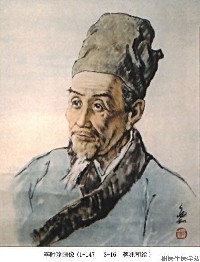Li Shizhen
Li Shizhen (1518-1593), whose style name was Dongbi and was also called Binhushanren (Person of the Mountain by the Lake) in his late years, was from Jizhou (now Jichun County of Hubei Province) during the Ming Dynasty (1368-1644). His grandfather was a doctor and his father, Li Yanwen (called "Yuechi"), was also a famous doctor locally. As a child, Li Shizhen began to read medical classics systematically and sometimes went with his father, treating diseases and copying prescriptions. But at that time, the social status of doctors was low so Li Yanwen did not hope Li Shizhen would take medicine as his occupation and asked him to take imperial examinations. For that purpose, he took Li Shizhen to Gu Riyan, a successful candidate in the imperial examination. Gu Riyan had a large collection of books which gave Li Shizhen the chance to read many rare classics.

(Source: tupian.hudong.com)
At the age of 14, Li Shizhen passed the examination with the title of "xiucai" (examinee who passed the imperial examinations at the county level). At the ages of 17, 20 and 23, he went to Wuchang to take the imperial exam at the provincial level, but failed each time. He then gave up the imperial examination and was determined to follow his father in learning medicine. He lucubrated at medical knowledge, spared no pain in taking the predecessors' experiences in medical treatment and was good at giving play to his own creativity. Coupled with his high sympathy for patients, he did not only show good curative craft but also high medical ethics in his practice. He won high prestige in just a few years. His cure for a strange disease in children called "worm addiction" in the Royal Family of Chu made his reputation rise rapidly. He was employed by the royal family as "fengcizheng" (an official title), in charge of affairs in the "liangyisuo" (Office of Good Doctors). Later, he was recommended to the "Hospital of Imperial Physicians" in Beijing to work as the "yuanpan" (chief doctor). However, he was not interested in the position and resigned on the pretext of illness after working for only a little more than one year.
In his medical practice, Li Shizhen found many mistakes, repetitions or omissions in medical books available, feeling it was a great problem that affected the health and life of patients. He compiled a new comprehensive book specializing in medicines. At the age of 34, he started the project. In addition to summing-up his predecessors' experiences and accomplishments, he learned extensively from medical farmers, woodmen, hunters, fishermen and other laboring people. He also went to deep mountains and fields to observe and collect samples of plants, animals, minerals and so on. He cultivated medical herbs himself and tried them on his own body in order to get the correct knowledge of the herbs. After 27 years of efforts with reference to more than 800 pieces of literature, he completed his monumental work in pharmacy, Compendium of Materia Medica, in the sixth year (1578) of the Wanli reign of the Ming Dynasty (1368-1644) at the age of 60. He based his book on Jingshi Zhenglei Beiji Bencao (a book on materia medica) by Tang Shenwei during the Song Dynasty (960-1279). After his book was published, he did a great deal of collation and supplementation, added many of his own findings and views, and carried out three important revisions.
Source: chinaculture.org
|

